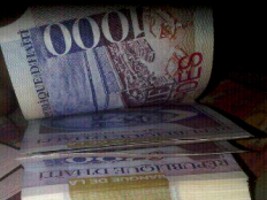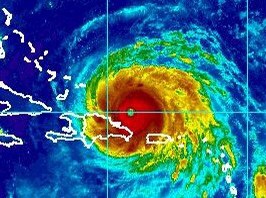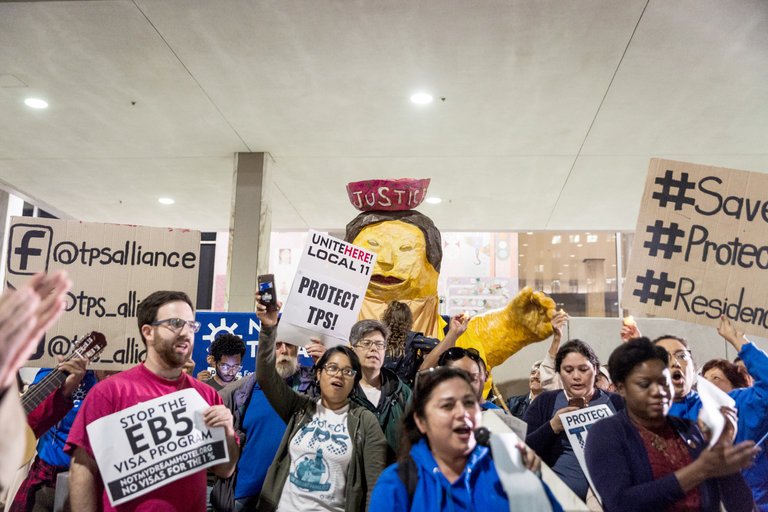A decade after a devastating earthquake hit Haiti, former President Bill Clinton and his wife, Hillary, the former U.S. secretary of state, are routinely portrayed in some quarters as the prime villains in the Caribbean nation’s continuing struggles to recover and the failed promise of donor assistance to help lift the ravaged country out of poverty.
It’s almost an article of faith among many Haitians that the Clintons somehow siphoned off billions of dollars meant to help clean up and rebuild.
The narrative — coupled with claims that the Clinton Foundation cashed in off development projects in the aftermath of the Jan. 12, 2010, disaster — has been peddled by anti-corruption lawyers in Haiti demanding an audit by government auditors, and even found its way into the 2016 U.S. presidential election: Republican presidential candidate Donald Trump promoted the unfounded claim as he tried to sway frustrated Haitian-American voters to choose him over Hillary Clinton, the Democratic nominee.
Now, as the world marks the 10th anniversary, Bill Clinton for the first time opened up about the setbacks in Haiti — a stain on the bright legacy of a former president who had championed democracy there and was the face of the international recovery efforts as he pledged to help Haiti “build back better.”
In an expansive interview with the Miami Herald at the Manhattan office of his Clinton Foundation, a mystified Clinton shot down accusations of stolen donations and reflected on his complicated relationship with Haiti, both as the U.N. special envoy-turned-reconstruction czar, and through the charitable works of his Clinton Global Initiative, Clinton Foundation and the Clinton Bush Haiti Fund that he and former President George W. Bush co-chaired to raise money after the quake.
“A lot of people seem to think that our group, the reconstruction commission, was getting money. We didn’t,” said Clinton, who served as co-chair of the Interim Haiti Recovery Commission, along with Haiti Prime Minister Jean-Max Bellerive. “We never took any donations.”
An advisory group with an 18-month mandate, the U.S.-backed panel was established by the Haitian government to accelerate rebuilding by ensuring that the efforts of foreign government donors, non-governmental organizations and businesses were aligned with the Haitian government’s development plan. Members included all donors who pledged $100 million or more to the recovery, plus Cuba and Venezuela with observer status, and 12 Haitians representing various sectors of society.
It was the first time, Clinton said, that Haitians from every major sector of society “had the first chance they ever really had to work with the international community.”
“It was a big cumbersome process, but it was totally transparent and we kept up with who funded what, who got the money, and did an after-action audit on all of them,” Clinton said about the commission, which ended its mandate on Oct. 21, 2011. “That’s a matter of record.”
Over the years, however, the commission’s failure to fulfill the international community’s promise of better construction and free public housing for Haitians has become a lightning rod in the debate over what happened to all the promised aid.
In Haiti, some blame the commission and the man at the head of it — Clinton.
The fact is that 10 years after the quake, there is no clear accounting of how much of the $13.3 billion that donors promised over 10 years remains uncollected.
One recent United Nations update underlined part of the problem. The World Bank, for example, had hoped to oversee a big chunk in its Haiti Reconstruction Fund but wound up collecting just $411.40 million from donors, roughly a quarter of its original target of $1.5 billion to $2 billion.
With the commission no longer active after its mandate expired under Haitian President Michel Martelly in 2011, it is unclear how much remains outstanding, given that no one has been pushing donors to pay up.
“I knew what would happen, and what happened happened,” Clinton said about Haiti’s decision to not renew the commission’s role and allow it to transition to a fully country-led Haitian Development Agency. “It slowed the willingness of the donors to honor their commitments and probably made them even more determined to control how the money was spent. That’s after I was done.”
The only money he did control was scrupulously tracked and documented, Clinton said. His Clinton Foundation and its Haiti Action Network, spearheaded by Irish billionaire Denis O’Brien, raised more than $500 million.
“All that money has been documented; 100% of it went to Haiti, and what we did with that was build new businesses,” Clinton said. “We never even took any administrative overhead for anything we did for it. I funded it all out of the foundation.”
The Clinton Foundation said commitments by members provided access to markets for more than 65,000 Haitian farmers; $19.2 million was invested in small and medium enterprises; and thousands of Haitians found employment thanks to investments by Timberland, NRG Energy and international retailers like West Elm, Urban Zen and TOMS.
Other investments include 150 schools constructed across Haiti by O’Brien, founder and CEO of one of the Caribbean’s largest mobile phone networks, Digicel. Challenged by Clinton to help him revive the country’s stagnant tourism sector, O’Brien built a $45 million, 175-room Marriott in Port-au-Prince and also put $12 million of his own money into restoring the 119-year-old Iron Market, the landmark bazaar and major tourist attraction ravaged by the quake.
The government-owned market, it turned out, wasn’t insured by the Haitian government, and a fire partially destroyed it in early 2018.
“Along the way, we’ve had some setbacks,” Clinton said. “The Iron Market burned and was never properly insured. And now because of all of the domestic unrest … we don’t know yet if we can save the Marriott. But in terms of what we did, I think we ran up a pretty good score, raised a lot of money, created a lot of jobs, helped a lot of existing Haitian businesses to expand and supported a lot of (non-governmental organizations) that were Haitian and doing well.”
All of his efforts, including his role as co-chair of the Clinton Bush Haiti Fund, which raised an additional $50 million to help businesses, had one goal in mind, Clinton said.
“We were trying to build Haiti through the Haitians. I didn’t want it to be an outside job. I wanted it to be an inside job,” he said. “And a huge number of people helped, but it couldn’t overcome the self-inflicted wounds of all this political dysfunction in the news.”
HAITI’S RECONSTRUCTION CZAR
When the earthquake struck shortly before 5 p.m. on a Tuesday afternoon, there was no template in Haiti to ensure that foreign donors and international NGOs, notorious for doing their own thing, would work within the Haitian government’s priorities for reconstructing a country that had suffered an estimated $7.9 billion in damage, according to a post-disaster needs assessment by the United Nations.
Then-President René Préval understood that if he wanted the U.S. to remain committed to the rebuilding, he had to adopt a mechanism for receiving aid that the White House would be comfortable with. Modeled after a similar post-tsunami group in Indonesia where Clinton had served as U.N. envoy, the Interim Haiti Recovery Commission became that blueprint and Clinton was asked to spearhead it.
The 42nd president of the United States, Clinton was no stranger to coming to Haiti’s rescue. As president, he sent 20,000 American troops to Haiti in 1994 to restore its first democratically elected president, Jean-Bertrand Aristide, after he had been deposed by a military junta.
In May 2009, less than a year before the earthquake, Clinton was asked by U.N. Secretary-General Ban Ki-moon to serve as U.N. special envoy. Haiti had been struck by two tropical storms and two hurricanes in less than 30 days and was struggling to raise $1 billion on the international market. Ban thought Clinton, with his profile and track record in Haiti, could inspire donor confidence and attract private investments.
Clinton agreed to the U.N.’s request just as he agreed to co-chair the quake recovery panel. He believed, he said, that the commission was the best mechanism for avoiding duplication of projects by donors and convincing them that their quake money would not be squandered.
“We needed donations on a scale that we had never achieved before and I thought in order to get that we had to do what was done in Indonesia,” he said. “They reported duly, every amount that came to the reconstruction effort. What the source was; how the money was spent, that is who got it; and after it was spent, was it spent well. Those three things were publicly available for all the world to see. That’s what I wanted to do.”
But while the commission had approval power over projects, it had no control over donors’ dollars.
That control lay with donors and the World Bank’s multi-donor trust fund, which could only be disbursed to one of three international agencies: the U.N., the World Bank and the Inter-American Development Bank.
Clinton and his co-chair Bellerive became so frustrated with the process six months into the commission’s existence that they co-wrote an op-ed in The New York Times admonishing the World Bank and calling on everyone in the recovery effort to do better.
In contrast to the commission, the World Bank fund included only one Haitian — the country’s minister of finance — and had a hard time convincing donors to pour their money into the Haiti Reconstruction Fund to pay for projects like removal of the 10 million cubic meters of debris that blanketed the quake-affected areas.
In addition to billions pledged by governments, international NGOs like the American Red Cross also raised an additional $3.06 billion for humanitarian relief. There was also more than $800 million in debt relief to Haiti by Venezuela and Washington-based financial institutions such as the IDB and the International Monetary Fund.
Recently, the United Nations Office of Dr. Paul Farmer, who served as special adviser to the Secretary-General of the United Nations and Clinton’s deputy special representative for Haiti, asked donors to provide up-to-date information on their pledges.
Of the top 10 donors contacted, six, including the U.S. Agency for International Development, which Hillary Clinton oversaw as U.S. secretary of state during the quake, did not respond.
When looking at disbursements two years after the quake, Farmer’s office found that donors disbursed more than half of the $10.37 billion that had been promised in recovery and humanitarian aid for 2010-12, or $6.43 billion. But of that amount, less than 10% went to the Haitian government, and even less, 0.6%, went to Haitian businesses and Haitian non-governmental organizations.
Most of the money went to international aid agencies, international NGOs and for-profit businesses.
Even so, Clinton believes that the recovery commission was the best chance Haiti had at changing the way foreign assistance was provided after what has been described as the hemisphere’s worst modern disaster.
Observers say that Haiti’s decision to do away with the commission came at a critical juncture and left the struggling recovery effort without a comprehensive policy to address issues like land titling, forced evictions or housing for the thousands of Haitians who remain internally displaced even today.
“That was a loss,” Luis Alberto Moreno, the head of the Inter-American Development Bank, said. “That basically began the un-coordination between donors that existed.”
Moreno, who got a seat on the commission after the IDB pledged $2 billion in recovery assistance and debt relief to Haiti, said he believes the criticism of both Clintons over their Haiti involvement is unfair.
“I saw them with a huge amount of commitment and honest dedication. I know that in Haiti politics are complex,” he said. As chair of the IHRC, Bill Clinton “put people to task,” Moreno added.
THE ‘BUILD BACK BETTER’ PROMISE
The earthquake was a catastrophe of epic proportions. All but one government ministry building toppled, 17% of the government’s workforce was killed, and millions were left homeless or injured in addition to the more than 300,000 dead.
But the response to get Haitians shelter, water and other basic services was chaotic and scattered, and donors were slow to make good on their commitments.
The most complex problem by far was the lack of permanent housing for the 1.5 million who were left homeless. It was the biggest problem Clinton wanted to solve and the one he could not in a country where land titles remain a sensitive and controversial topic.
“I thought one of the best things we could do in Haiti would be to build a domestic housing industry,” said Clinton, who had promoted a housing expo that was key to his “build back better” promise but flopped after it didn’t receive support from donors or the Haitian government. “What I wanted to do was to develop energy-efficient, water-efficient, sanitary housing, in a range of costs, anywhere from tiny houses, you know, small houses of $2,000, up to what were quite comfortable houses at about $30,000.”
Some saw Préval’s refusal to put land expropriation decisions in the hands of foreigners to build houses for quake victims as the problem. Leslie Voltaire, who was in charge of housing initiatives early in the recovery, said the problem was the Haitian constitution.
“You cannot give land to anybody” under the constitution. “You can donate it, but by donating the land, (the recipient) cannot sell it,” Voltaire said.
Clinton says he doesn’t regret his “build back better” campaign, but he regrets “that the political system didn’t embrace building all of these new businesses and creating all of these new jobs that would have come out of home construction.”
“I still believe that if you’re going to build a modern society, you have to have a land titling system,” he said. “If I had known that it would have proven intransigent and how many people thought they were supposed to receive the benefits of construction projects, when they had nothing to do with it, I might have spent my energy somewhere else, not, in another country.”
THE ELECTIONS PUSH
As Clinton was trying to hold donors accountable for their promises, his wife and others in the international community were pushing Haiti to hold legislative and presidential elections in the midst of the recovery and a deadly cholera outbreak introduced by Nepalese soldiers with the U.N. peacekeeping mission.
For Haitians, Clinton soon went from being the hero who helped restore democracy to being suspected, along with his wife, of manipulating the disputed 2010 presidential vote that brought Martelly to power.
“I have to say at the time it was not clear to me what the choice was between Martelly … and Mrs. Manigat,” Clinton said, referring to the second round runoff between Martelly and former first lady Mirlande Manigat. He did not back a candidate in the elections, he added.
As for whether the U.S. should have forced Haiti to hold elections as outlined in its constitution, he said: “I leave that to others to figure out whether we should have (had the elections). It’s a very hard thing, if you’re the country outside looking in, to say, ‘Well, it’s OK for you not to have this election (at this time) because we know it’s a mess.’ “
Following the earthquake, many Haitians had become frustrated with Préval, who was often slow to make decisions and was, along with other Haitian politicians, uncomfortable with the recovery commission’s potential power and scope.
Préval’s inability to act decisively and his vacillation concerning the handover to the Clinton-controlled commission of certain governmental powers such as land expropriation for reconstruction projects may well have dampened the enthusiasm of the international community and hampered certain recovery efforts.
Préval has said he always believed that his refusal to give the commission authority on land titles caused him to lose the support of the U.S. Others also believe that his failure to cope with the earthquake crisis condemned anyone he supported to failure.
“I think if President Préval had used the power the Haitian Parliament had given him, basically to do whatever he wanted to do as long as he didn’t violate the constitution … I think he would have found a more willing ear to allow a different time frame,” Clinton said, referring to holding the election and Préval’s refusal to expropriate land.
The quake occurred in an electoral year, delaying legislative elections and raising questions about the presidential vote. When the balloting finally occurred that November, it triggered a political crisis. Martelly, Manigat and other presidential candidates alleged fraud and disrupted the voting before it was completed. The Organization of American States was called in and Hillary Clinton personally flew to Haiti to force Préval to accept the OAS’ recommendation to remove his candidate, Jude Célestin, from the runoff and replace him with Martelly, a popular singer.
The OAS recommendation was based on a sample of ballots in the first round and proposed that Manigat and Martelly — and not Célestin — advance to the runoff. But an independent analysis of first-round ballots by the Center for Economic and Policy Research concluded that the OAS report was statistically flawed, and that the first round of elections should be redone. The U.S. and other parties rejected that proposal.
“The scandal isn’t that the Clintons stole money for themselves, it’s that they played an outsized role in determining Haiti’s path forward after the election — and that that path has been paved with failures,” said Jake Johnston, a senior researcher with the Washington-based Center for Economic and Policy Research, whose Relief and Reconstruction Watch blog tracked Haiti’s earthquake relief efforts.
“After the earthquake, the priority was stability — as it has been the priority of international actors for decades. But Haiti didn’t need stability as much as it needed change,” Johnston said. “Change from the aid habits of old, change from the politics of old, change from the failed development models of old, change from the massive inequality that had steadily eroded the nation’s democracy.”
Despite having twice been elected president, Clinton said he never advised his wife on her job as secretary of state — nor did she advise him on his role.
“We had distinctly different roles,” he said. “I know that might be hard for people to believe, but she didn’t advise me on my U.N. job. I mean, once you take these jobs, you have to do them as you see fit. And based on what you think you gotta do.”
Hillary, he said, did the best she could at the time. He recalled that, even in terms of aid, she had a Republican Congress that wasn’t sympathetic toward Haiti. Unlike a nation like Brazil, which was the first to make a contribution to the World Bank’s Haiti’s Reconstruction Fund, the U.S. Congress “expected the United States to get and control its money directly.”
“That’s what they did. But that wasn’t so much Hillary,” Clinton said. “I thought Hillary did about as much as she could, given the pressure she was under, from people who were not sympathetic.”
‘I WOULD DO IT AGAIN TOMORROW’
For his part, Clinton said his wish for Haiti is the same today as it was in 1994 when he returned Aristide to office, but the U.S. Congress didn’t give him any development dollars to help shore up the country and the best he could do was leave the U.S. Army Corps of Engineers there for a year.
“I would like for Haiti to be a democracy,” he said. “There’s a fundamental goodness and energy about the people and an almost unlimited capacity. And they’ve been worked over for 200 years by outsiders and then by their own people who got ahold of political power and used it very often the way outsiders have.
“And I don’t think that this country will ever realize its full potential until it builds systems that bring everybody together and make good decisions in an open and honest way,” he added. “But I would do it again tomorrow.”


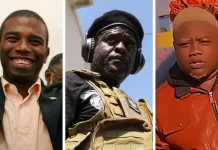
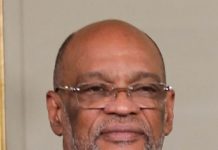

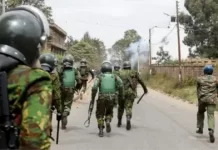



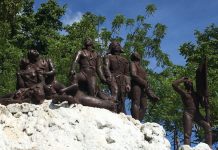



















![Phyllisia Ross – KONSA [Official Music Video]](https://haitiville.com/wp-content/uploads/2014/08/phyliisia.jpg)






